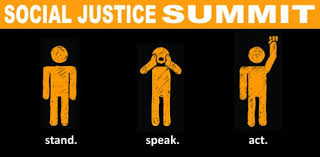Social Injustice ∼ 4 Poems by Charles Rammelkamp
Social Injustice
∼
4 Poems by Charles Rammelkamp
Narration by Charles Rammelkamp
Out of His Mind
Richards didn’t admit
in the voir dire process
during jury selection
he believed the police
almost always right,
but in the jury deliberation room,
when he’d been chosen for the jury,
he couldn’t help thinking,
even though the black kid
the cop shot in the back
hadn’t had a gun,
the officer sounded so sincere
when he said he’d felt “threatened,”
thought he saw a pistol
in the boy’s hand.
Richards voted to acquit the cop.
He just wished he could get
the image of the kid’s mother,
grief personified, as if wearing a mask,
tears streaming down her cheeks,
shrieking like a banshee,
out of his mind.
Que es su problema?
“Get the fuck out of my country!”
The woman’s voice squealed like a rusty hinge.
We turned in our booth
in the West Virginia diner.
We’d stopped for lunch
on our way back to Baltimore
from a weekend of cross-country skiing.
A chunky woman with bleach-blond hair,
an apron around her ample waist, glowered
at a Mexican man, his arms spread
in a gesture of innocence.
“You’re in America!”
The woman cattle-prodded her finger at him.
“You need to speak English!”
“Que es su problema?” the man needled.
“I am an American citizen!”
“Just get the fuck out my country!”
“You watch your mouth,” a local white man scolded,
drawling in the same country accent as the woman’s.
“He’s a good man. Leave him alone.
Just mind your own business!”
“This is my business.
I can serve whoever I want!”
We left the restaurant,
leaving cash for the food,
but not a tip.
Lost in Traffic
They call me a “survivor” of sex trafficking
in the newspaper. Survivor?
True, I’m no longer in Coakley’s power,
the dude I met outside the medical center
where I was treated for an OD.
He hired me to work as a receptionist
at one of his massage parlors,
then blackmailed me to turn tricks
or he’d turn me back in to the cops.
Besides, I relied on him
for my food, my clothing, a place to stay.
Some of the other girls, the immigrants,
he threatened turning them in,
saying he could get them deported,
and we were all ashamed in some way;
he said he’d show videotapes
to our relatives, us engaged in sex acts –
sometimes it was one after the other after
the other, all night long –
or he’d send them to the Social Services,
have the kids taken away.
At least I didn’t have any kids,
just my dad and mom,
which was bad enough.
He photographed some of us, too,
for online ads to lure more customers.
Coakley? He got seven years when they busted him.
I testified, all right,
but I haven’t “survived” anything.
I still wake up nights sweating from those dreams,
screaming, crying, punching the air.
Breath Is Life
Laquan gasping for breath,
my little three-year-old boy,
I looked out the grimy cracked window
at Old Smokey, the city trash incinerator,
belching out cancer-causing smoke.
Of course they’d built it here,
where us poor folks live.
Where else they gonna put it?
Made me remember Aunt Bessie
down in Cancer Alley, Louisiana,
that stretch along the Mississippi
between Baton Rouge and New Orleans,
the pollution from the petrochemical companies
killing her sure as if she’d eaten poison,
breakfast, lunch and supper.
“It’s okay, baby,” I whispered to Laquan,
“I’m here. Your mama’s here,”
rocking him in my arms, the canaries
in the coaldust of his little birdcage of a chest
beating their frantic little wings,
trying so hard to get out.

